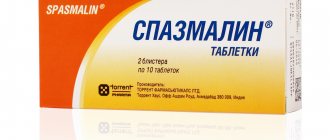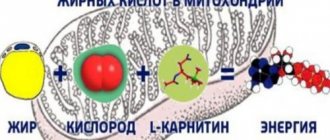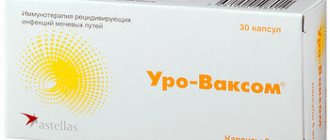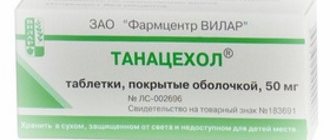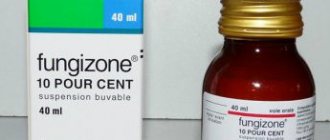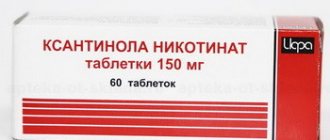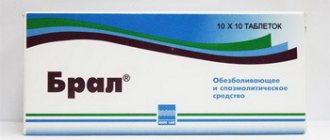Amprilan is a powerful antihypertensive drug of the ACE inhibitor group. The drug is used for arterial hypertension, chronic glomerulonephritis with proteinuria, CHF, diabetic nephropathy, as well as to reduce mortality and the likelihood of developing stroke and myocardial infarction in patients with a predisposition. Amprilan is contraindicated in cases of severe arterial hypotension, pregnancy, bilateral or unilateral stenosis of the renal arteries, history of angioedema, primary hyperaldosteronism, renal failure, lactation, previous kidney transplantation, hemodialysis, hypersensitivity, treatment of nephropathy with corticosteroids, NSAIDs, immunomodulators or cytostatics, lactose intolerance, significant mitral or aortic stenosis, HOCM, CHF at the stage of decompensation and in pediatric practice.
Description and composition
1 tablet of Amprilan may contain 1.25 mg, 2.5 mg, 5 mg or 10 mg of ramipril.
Additional substances:
- lactose monohydrate;
- sodium stearyl fumarate;
- croscarmellose sodium;
- sodium bicarbonate;
- yellow iron oxide dye (for dosage 2.5 mg and 5 mg);
- red iron oxide dye (for a dosage of 5 mg);
- pregelatinized starch.
Additional Information
For patients over 65 years of age, as well as diabetics and people with renal failure, Amprilan is prescribed at a dosage of 1.25 mg once a day, with maintenance therapy - 2.5 mg. The maximum daily dose should be no more than 5 mg.
If treatment with Amprilan is planned, previous antihypertensive therapy is discontinued three days before.
For patients with malignant hypertension, the dosage of the drug is increased gradually, while kidney function, blood pressure, body weight, as well as protein, creatinine and potassium levels are constantly monitored. All patients are prescribed a diet.
Since Amprilan has a negative effect on the fetus, before starting a course of treatment, women must be examined by a gynecologist in order to exclude the presence of pregnancy, and in order to avoid its occurrence during therapy, careful contraception is recommended. Also, this drug is not prescribed to women who are planning a pregnancy; if pregnancy occurs during treatment, the drug must be immediately discontinued or replaced with another.
During treatment with Amprilan, the consumption of alcoholic beverages is strictly prohibited.
Drivers and people whose professional activities require increased concentration of attention should take Amprilan with caution.
Pharmacological group
The drug Amprilan is an angiotensin-converting enzyme inhibitor. The pharmacological effect of the drug leads to a decrease in the concentration of angiotensin II and an increase in renin activity in the blood serum, an increase in the production of aldosterone and a potentiation of the effect of bradykinin. The decrease in blood pressure is the result of a decrease in total peripheral vascular resistance due to the dilation of blood vessels. In this case, the heart rate does not change. Also, long-term use of the drug Amprilan leads to a decrease in left ventricular hypertrophy.
The drug is effective in the treatment of chronic heart failure. In the case of a recent myocardial infarction, Amprilan reduces the risk of death, the development of heart failure and reduces the likelihood of exacerbation of chronic heart failure. In patients with diabetes mellitus, ramipril reduces the risk of developing nephropathy and reduces existing microalbuminuria.
Pharmacodynamics and pharmacokinetics
Ramipril is an angiotensin-converting enzyme inhibitor (ACEI), whose function is to accelerate the transformation of angiotensin I to angiotensin II. After the patient initially takes the drug, a decrease in blood pressure may already be registered after 2 hours (sometimes earlier). The maximum therapeutic effect is observed 4-6 hours after administration and lasts throughout the day. Taking the medication for 2-3 months reduces hypertrophy of the left cardiac ventricle, without any negative effect on the function of the organ.
The drug prevents the development of nephrotic diseases (including in patients with diabetes). It also has a strong effect in the treatment of heart failure. If signs of this disease are found in a patient who has had a heart attack, the use of the drug reduces the risk of mortality associated with diseases of the cardiovascular system. The listed positive effects are observed in patients both with and without signs of hypertension.
About 70% of the active component binds to plasma albumin. Regardless of whether the drug was taken with food or not, ramipril has very rapid absorption: within an hour after taking the tablets, its highest plasma concentration can be recorded. In the liver, it is broken down into metabolites - active (ramiprilat - its activity is 6 times higher than the activity of the original substance) and inactive (diketopiperazine).
The highest concentration of ramiprilat is recorded 3-4 hours after administration. A stable therapeutic concentration accumulates in the blood after 4 days of treatment. About 55% of the active metabolite is bound to plasma proteins.
Rampril and its active metabolite are excreted by the kidneys, with up to two percent of the former being excreted unchanged. Its half-life is just over 5 hours. For ramiprilat, its duration is up to 17 hours. Moreover, in patients with kidney disease, these indicators increase in proportion to the decrease in creatinine clearance. In patients with liver failure, laboratory tests show increased levels of unchanged ramipril in the blood. This is because deteriorating liver function affects its metabolic capacity.
A laboratory comparative study of the metabolic characteristics of ramipril in young and elderly healthy people did not reveal any significant differences.
Ramipril
Indications for use
Amprilan is indicated for patients suffering from diseases associated with high blood pressure.
for adults
Indications for taking Amprilan in adult patients are:
- arterial hypertension;
- diabetic nephropathy (including pathology associated with chronic forms of diffuse kidney disease);
- chronic glomerulonephritis, accompanied by severe proteinuria;
- chronic form of heart failure (including pathology that appeared several days after myocardial infarction);
- reducing the risk of development, stroke, myocardial infarction and mortality in patients with a predisposition to diseases of the cardiovascular system, a history of stroke, occlusive lesions of peripheral arteries and recent surgical interventions in the cardiovascular system (for example, coronary artery bypass grafting or angioplasty).
for children
Amprilan is not used in pediatric practice.
for pregnant women and during lactation
The drug Amprilan is contraindicated during pregnancy and lactation. If it is absolutely necessary to take it during lactation, breastfeeding should be discontinued.
When use is contraindicated
Despite its numerous beneficial properties and wide range of applications, the drug Amprilan also has a significant number of contraindications, some of which are absolute, while others are relative.
Absolute contraindications
Doctors strictly prohibit patients who have the following clinical contraindications from taking Amprilan for high blood pressure:
- Arterial stenosis;
- Hypotonic disease (low blood pressure);
- Inflammatory processes affecting cardiac tissue structures;
- Individual intolerance and hypersensitivity to the substances contained in the tablets;
- Previous surgical interventions for kidney transplantation;
- Heart valve stenosis;
- Renal dysfunction;
- The presence in the patient's medical history of angioedema of an angioedema nature;
- Renal artery stenosis;
- Carrying out a treatment course in patients with diagnosed nephropathy using cytostatics, hormonal medications, immunomodulators, non-steroidal anti-inflammatory drugs.
Treatment with Amprilan is strictly contraindicated for young patients under the age of majority, women expecting the birth of a baby, and young mothers during breastfeeding.
Heart valve stenosis
Conditionally acceptable use
With increased caution, Amprilan for blood pressure is prescribed to patients with the following health problems:
- Hyperkalemia;
- Lupus erythematosus;
- Unstable form of angina;
- Damage to large arteries of the brain, due to increased risks of disruption of the blood supply to these vital organs;
- Irregular heart rhythm (arrhythmia);
- Diseases accompanied by diarrhea, profuse vomiting;
- Hyponatremia;
- Pulmonary heart in the stage of decompensation.
Treatment of this category of patients with Amprilan tablets requires selection of an individual dose of the drug and constant strict medical supervision!
Contraindications
Main contraindications to the use of Amprilan:
- pregnancy;
- hemodialysis;
- history of angioedema (idiopathic, hereditary or angioedema due to the use of ACE inhibitors);
- hypersensitivity;
- renal failure;
- stenosis of the artery of a single kidney;
- bilateral renal artery stenosis (hemodynamically significant);
- recent kidney transplant;
- GW period;
- severe arterial hypotension;
- treatment of nephropathy with NSAIDs, glucocorticosteroids, cytostatics or immunomodulators;
- children under 18 years of age;
- primary hyperaldosteronism;
- HOCM (hypertrophic obstructive cardiomyopathy);
- galactose-glucose malabsorption, lactase enzyme deficiency, lactose intolerance;
- decompensation of chronic heart failure;
- aortic or mitral stenosis (hemodynamically significant).
Relative contraindications:
- malignant arterial hypertension;
- severe dysfunction of the cerebral and coronary arteries;
- severe forms of ventricular rhythm disorders;
- unstable angina;
- liver failure;
- decompensated cor pulmonale;
- chronic form of heart failure;
- aortic or mitral stenosis;
- hyperkalemia;
- inhibition of hematopoiesis in the bone marrow;
- elderly age;
- diabetes;
- concurrent desensitization therapy;
- hyponatremia;
- period before LDL apheresis;
- systemic pathologies of connective tissue;
- decrease in circulating blood volume.
Interaction
ACE inhibitors, including ramipril, increase the depressant effect of alcohol on the nervous system. Drinking alcohol while taking the drug puts a significant burden on the liver, so when treating with this drug, the use of products containing ethanol should be avoided.
Concomitant use of ATP inhibitors and non-steroidal anti-inflammatory drugs worsens renal function and may contribute to the development of acute renal failure.
Drugs based on epinephrine neutralize the ability of Amprilan to reduce blood pressure.
Tricyclic antidepressants, on the contrary, enhance the hypotensive effect of the drug.
When ramipril was used with lithium-based drugs, a strong increase in plasma lithium levels was observed, approaching concentrations that have a toxic effect.
A number of drugs, when taken together with ramipril, can contribute to the development of leukopenia. These include:
- Cytostatics;
- Procainamide;
- Immunosuppressants;
- Allopurinol;
- Glucocorticoids.
Applications and dosages
Amprilan tablets should be taken orally without compromising the integrity of the dosage form. It is necessary to use the product regardless of food intake, drinking plenty of water. The therapeutic dose should be selected individually by the doctor, taking into account the specifics of the pathology and the degree of tolerability of the drug by the patient. The duration of treatment is determined by the attending physician.
for adults
Arterial hypertension:
The initial dosage is 2.5 mg 1 time per day. After 7–14 days, you are allowed to double the dose. The maximum daily dose is 10 mg. Maintenance dose – 2.5–5 mg per day.
Chronic heart failure:
The initial dosage is 1.25 mg 1 time per day. After 1–2 weeks of use, you are allowed to double the dose. The maximum daily dosage is 10 mg.
Heart failure (including pathology after myocardial infarction):
The initial dosage is 5 mg per day, divided into 2 doses of 2.5 mg. The product should be taken morning and evening. In case of poor tolerability, the dosage of Amprilan is reduced to 1.25 mg 2 times a day. After some time, the doctor may prescribe a daily dose in 1 dose. The maximum daily dose is 10 mg.
Diabetic nephropathy:
The initial dose is 1.25 mg 1 time per day. Every 2 weeks of continuous use, you can double the dosage up to a maintenance rate of 5 mg once a day.
Reduced risk of death, stroke, or heart attack:
The recommended dosage is 2.5 mg once a day. The amount of product can be doubled after 1 week. Subsequent doubling is allowed only after 2–3 weeks. The maximum dose is 10 mg per day.
for children
Children and adolescents under 18 years of age are prohibited from taking Amprilan.
for pregnant women and during lactation
The product is contraindicated for pregnant and lactating patients.
Brief information about the medicine
The blood pressure medicine Amprilan belongs to the pharmacological group of ACE inhibitor drugs. Normalizes blood pressure, reduces the likelihood of complications from the cardiovascular system due to hypertension.
Release form
The blood pressure drug Amprilan is produced by the manufacturer in a tablet form convenient for home use. The medicine is sold in blisters containing 7 or 10 tablets. The tablets have a white, yellow or pinkish color depending on the amount of the main active ingredient.
Compound
The main active component of the tablets is ramipril, presented in dosages of 1.25, 2.5, 5 or 10 mg.
The drug also contains auxiliary ingredients such as lactose monohydrate, starch, sodium bicarbonate.
pharmachologic effect
Amprilan blood pressure tablets are characterized by the presence of hypotensive, ACE-inhibiting and vasodilating properties.
Packaging of Amprilan tablets
Manufacturer
The drug Amprilan is produced by the Slovenian company KRKA.
Terms and conditions of storage
The maximum permissible shelf life of the drug is 2 years. It is recommended to store the tablets in a place inaccessible to children and pets, at a temperature not exceeding +30°C.
Terms of sale
To purchase the drug Amprilan in pharmacy chains, you must present the appropriate medical prescription to the pharmacist.
Price
The exact price of the drug is determined by factors such as the number of tablets in the package, the dose of the main active ingredient, and the policy of a particular pharmacy chain. The estimated cost of Amprilan tablets varies from 170 rubles to 490 rubles.
Side effects
The most common side effects are:
- feeling of heartbeat;
- insomnia, drowsiness (very rare);
- dry mouth;
- significant reduction in blood pressure;
- dizziness;
- chest pain;
- dry cough;
- kidney dysfunction;
- disorders of auditory and visual perception;
- angina pectoris;
- Raynaud's syndrome;
- attention disorder;
- arrhythmia;
- arthralgia;
- headache;
- paresthesia;
- photosensitivity;
- hepatitis;
- tachycardia;
- myocardial infarction;
- dyspnea;
- fainting;
- depressive states;
- excitability and irritability;
- a sore throat;
- anorexia;
- pulmonary embolism;
- orthostatic collapse;
- proteinuria;
- weakness and fatigue;
- hypercreatininemia;
- pharyngitis;
- thrombocytopenia;
- alopecia;
- intestinal obstruction;
- dyspeptic disorders;
- fever;
- bronchospasm;
- jaundice;
- Quincke's edema;
- stomatitis;
- skin rash;
- decreased libido;
- increased sweating.
- hyperbilirubinemia;
- agranulocytosis;
- myalgia;
- tides;
- itching and urticaria;
- hyperkalemia;
- pemphigus;
- neutropenia;
- decrease in hematocrit and hemoglobin concentrations;
- ischemic stroke;
- vasculitis;
- nasal congestion;
- gynecomastia;
- decreased appetite;
- pancreatitis.
Adverse reactions
Despite the fact that Amprilan lowers blood pressure and has a positive effect on the cardiovascular system, the use of this drug can cause the following side effects:
- Migraine attacks;
- A sharp and excessive decrease in blood pressure;
- Cough syndrome;
- Muscle pain;
- Sinusitis;
- Nausea and vomiting;
- Convulsive syndrome;
- Diarrhea;
- Allergic skin rashes;
- Bronchitis;
- Inflammatory processes affecting the mucous membranes of the gastrointestinal tract;
- Excessively intense sweating;
- Arrhythmia;
- Joint pain;
- Psycho-emotional instability, causeless nervousness, anxiety, irritability;
- Attacks of dizziness;
- Sleep disorders;
- Liver inflammation;
- Impaired renal function.
It is extremely rare that treatment with Amprilan causes the development of pathological conditions such as dermatitis, ischemic disease, tachycardia, heart attack or stroke.
Interaction with other drugs
Amprilan enhances the harmful effects of ethyl alcohol on the central nervous system.
Vasopressor sympathomimetics reduce the therapeutic effect of ramipril.
ACE inhibitors increase the concentration of lithium in the blood when used in parallel with lithium preparations.
NSAIDs reduce the hypotensive effect of the drug and increase the risk of developing renal dysfunction and increasing potassium levels in the blood.
Antipsychotic medications and tricyclic antidepressants potentiate the hypotensive effect of Amprilan and increase the risk of hypotension.
Glucocorticosteroids reduce the effectiveness of the drug due to fluid retention in the body.
It is not recommended to combine Amprilan with potassium-sparing diuretics, potassium-containing salt substitutes and potassium supplements.
ACE inhibitors enhance the effect of insulin and hypoglycemic sulfonylurea drugs.
Immunosuppressants, corticosteroids, cytostatic agents, procainamide and allopurinol increase the risk of leukopenia.
Amprilan may enhance the effects of general anesthetics.
Gold preparations for intravenous administration in combination with Amprilan can cause facial flushing, decreased blood pressure, nausea and vomiting.
Pharmacological compatibility
The simultaneous use of Amprilan tablets with medications that include epinephrine significantly reduces the ability of the drug to lower blood pressure.
The combination with antidepressants, on the contrary, enhances the antihypertensive effect of the tablets, which can cause a sharp decrease in blood pressure and the development of a hypotensive crisis.
During the therapeutic course with the drug Amprilan, the consumption of alcoholic beverages and alcohol-containing medications is strictly prohibited due to excessive inhibition of the functions of the central nervous system and increased load on the liver.
Combination with non-steroidal anti-inflammatory drugs is also dangerous, as it increases the likelihood of developing renal dysfunction.
The combination of Amprilan with glucosteroids, cytostatics, and immunosuppressants leads to the development of leukopenia in the patient.
The combination with lithium preparations helps to increase the concentration of the latter in the human blood, which threatens a severe form of poisoning and intoxication of the body.
Amprilan may be incompatible with other medicines
special instructions
When treated with Amprilan, patients may develop a dry cough. When you stop taking the drug, this symptom disappears.
During the course of Amprilan therapy, regular monitoring of renal function should be carried out in patients with heart failure and renal impairment.
No later than 12 hours before the start of surgery, you should stop taking Amprilan. You should also warn the anesthesiologist about your recent use of ACE inhibitors.
During the period of therapy, you should refrain or take special care when driving vehicles, complex mechanisms and carrying out activities that require reaction speed and concentration.
What to replace with arterial hypertension
On pharmacy shelves you can find and purchase the following analogues of Amprilan:
- Vasolong;
- Pyramid;
- Dilaprel;
- Hartil.
It is important not to self-medicate, but to entrust the selection of the optimal analogue to a qualified specialist!
Amprilan for high blood pressure is an effective antihypertensive drug with a long-term therapeutic effect. The use of tablets will also be useful for people with heart failure and cardiac diseases. However, due to a wide range of contraindications, the drug can only be used as prescribed by a doctor!
Overdose
Overdose symptoms:
- a sharp and pronounced decrease in blood pressure;
- acute renal failure;
- shock;
- bradycardia;
- stupor;
- disturbances of water-salt balance.
Therapy for mild intoxication:
- gastric lavage;
- use of sorbents;
- use of sodium picosulfate.
Therapy for severe intoxication:
- intravenous use of alpha1-adrenergic agonists, angiotensin II and catecholamines;
- replenishment of circulating blood volume with 0.9% sodium chloride solution;
- installation of a temporary pacemaker for bradycardia.
Drug overdose
Taking Amprilan tablets in excessively large dosages can lead to the following alarming clinical signs:
- Severe renal dysfunction;
- Slow heart rate (bradycardia);
- Excessive decrease in blood pressure to critical levels (hypotonic crisis);
- Violation of water and electrolyte balance, dehydration of the body;
- State of shock.
If such symptoms occur, the victim must undergo gastric lavage. Afterwards, if there is a strong decrease in blood pressure, lie the patient down, elevating his upper limbs, and administer intravenously the appropriate medications prescribed by medical specialists.
In case of significant disturbances in heart rhythm, surgery and installation of a pacemaker may be indicated.
An overdose of Amprilan should be treated by professionals. First aid consists of inducing artificial vomiting and taking sorbents.
An overdose of the drug can cause a sharp drop in blood pressure
Analogs
The drug Amprilan can be replaced with a similar drug directly during the treatment period or before the start of therapy. Effective analogues of the drug are:
Cardipril
Tablet ACE inhibitor containing ramipril in similar dosages. Due to the absolute structural similarity, Cardipril can replace Amprilan without any damage to the therapeutic process.
Dapril
Contains 5 mg, 10 mg and 20 mg of lisinopril dihydrate. Belongs to the group of ACE inhibitors. The drug is used to treat nephropathy in diabetes mellitus, arterial hypertension, heart failure and acute myocardial infarction. It has a wider list of restrictions on use.
Ordilat
The active element in the drug Ordilat is perindopril. The drug is a powerful ACE inhibitor. Indications for the use of Ordilat are: arterial hypertension, prevention of secondary stroke in cerebrovascular disorders, prevention of various cardiovascular pathologies in patients with coronary heart disease and heart failure. Contraindications are the same as Amprilan.
What does Amprilan help with?
Medical experts recommend drinking Amprilan for high blood pressure in patients who have the following indications for the use of this drug:
- Hypertonic disease;
- Disorders of arterial circulation processes of an occlusive nature;
- Nephropathy (including those developing against the background of diabetes mellitus);
- Chronic heart failure;
- Arterial hypertension of various etiologies;
- Glomerulonephritis, with concomitant increased levels of protein in the urine;
- Ischemic disease;
- Angina;
- The presence in the patient’s medical history of a recent stroke or heart attack;
- Pathologies of peripheral blood vessels;
- Proteinuria.
For preventive purposes, tablets can also be recommended for patients who have undergone surgery on large arteries or coronary bypass surgery.
The drug helps avoid the dangerous consequences of hypertension
